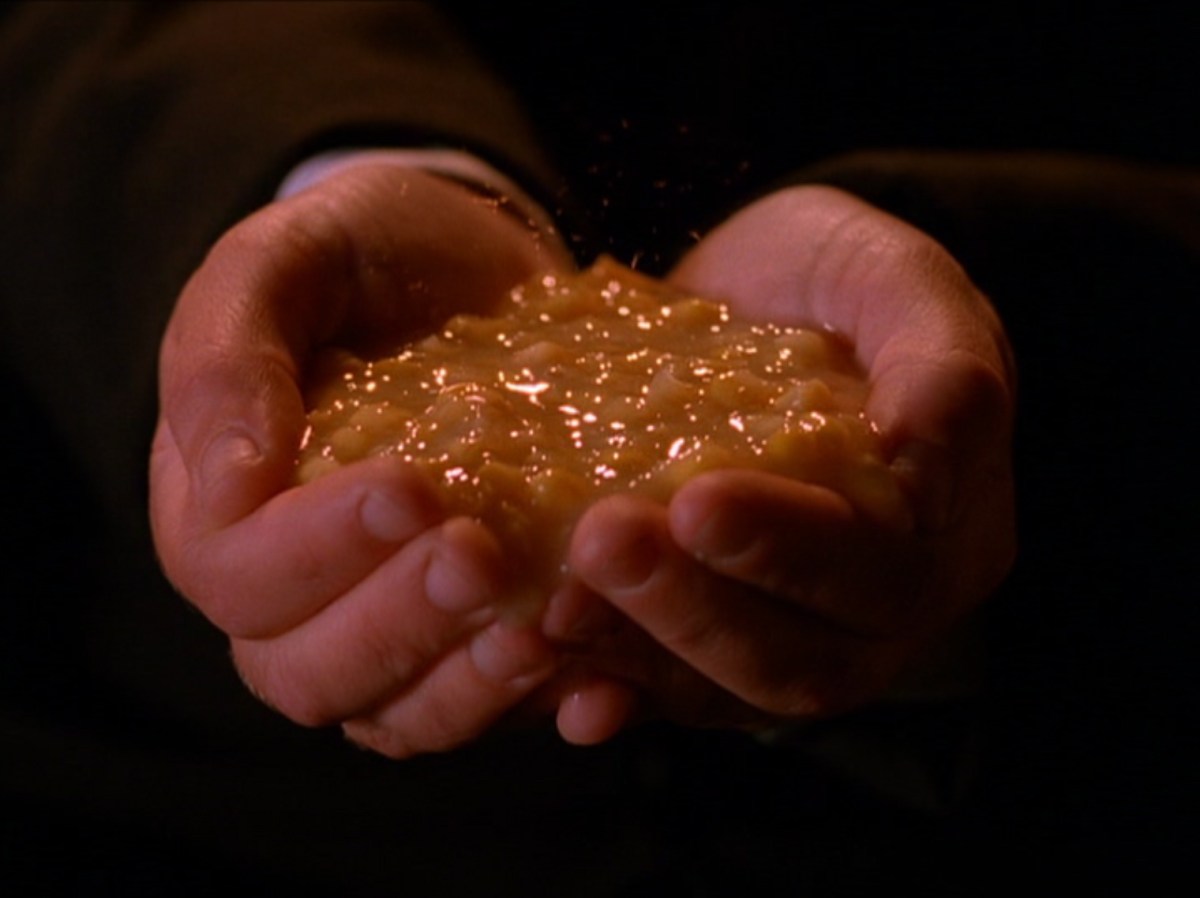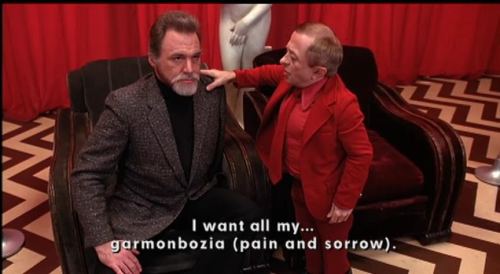What language do the Lodge entities speak amongst themselves? In Twin Peaks, we hear them use English, but Mark Frost’s The Secret History of Twin Peaks has made it very clear that they preexisted the arrival of Europeans in Northern America by many years (though Time is a complex notion in Twin Peaks). The only non-English word we hear them use is the now famous “Garmonbozia”.

Is this a made up word? I tend to think that David Lynch’s attention to details makes this very unlikely. He definitely enjoys obfuscating the true meaning of his creations, but underneath it all, there’s always an explanation, a way to decipher what it all means.
In the case of Garmonbozia, I would like to suggest Sanskrit: “In Vedic religion, “speech” Vāc, i.e. the language of liturgy, now known as Vedic Sanskrit, was considered the language of the gods”. Lynch opened several chapters from his book Catching the Big Fish with quotes from the Upanishads, and it is now common knowledge that he follows the teachings of the Maharishi Mahesh Yogi, the initiator of Transcendental Meditation. Moreover, the show is replete with elements connected to the Himalayas, Tibet, Nirvana, etc. Sanskrit therefore sounds like a rational choice for “the language of the Gods”.

I do not read Sanskrit, so I do not claim that what I have found is firm proof concerning the meaning of “Garmonbozia”, but using various online dictionaries, I definitely found a word combination that appears to make a lot of sense in the context of Twin Peaks. I believe that Garmonbozia might actually be a composite of “gharma” and “bodhya”. Here is the meaning of these two terms:
Gharma: “The Sanskrit “ghr” means “burn” “shine” “moisten” “sprinkle” “ghrna” means “heat” “warmth” “ardour” “sunshine” “ghrni” means “glowing” “ray of light” “flame” “passion” “day” “Sun” and “gharma” means “heat” “warmth” “sunshine”… As mentioned “Ghr” also produces the Sanskrit “gharma” meaning “heat” “warmth” “sunshine” and in the Rig Veda it becomes the “pot” for “boiling” the milk to be offered to the Gods“. I also found this (in French): “घर्म gharma [ghṛ] m. chaleur brûlante, saison chaude; feu intérieur; sueur || gr. θερμος; lat. formus; ang. warm” = burning heat, inner fire.
Bodhya: “बोध्य adj. bodhya to be enlightened or instructed“.
Could Garmonbozia actually mean “to be enlightened by the inner fire“, i.e. the heat produced by the food grown from pain and sorrow? What is certain is the fact that fire walks with those who eat it, the golden fire of enlightenment, from digestive alchemy. The answer to many mysteries found in Twin Peaks might very well lie within the realm of ancient Vedic teachings.
Follow Unwrapping the Plastic: https://www.facebook.com/unwrappingtheplastic/

Love this post, Franck. That said, I think this is fundamentally wrong “I tend to think that David Lynch’s attention to details makes this very unlikely. He definitely enjoys obfuscating the true meaning of his creations, but underneath it all, there’s always an explanation, a way to decipher what it all means.”
It seems to me – and I’m basing this on things he’s said in countless interviews, on what his collaborators have to say about him, and watching the guy direct – that his attention to detail is not the same as him knowing what everything means. I also don’t think he enjoys obfuscation or codifying. On the contrary, he demonstrably values *not having it figured out*: he’s always searching for synchronicity, accident and his own spontaneous impulses when he’s creating. His interests always lie more in feelings and aesthetics than in plot points. Even his use of the word “idea” seems to point less to concepts than aesthetic constructs.
There’s a reason why Frost always does the heavy work of filling in the gaps in the world building, plot, etc…: For Lynch that stuff is secondary, possibly even stale.
(This is Ad btw)
LikeLiked by 1 person
Thank you for your comment! I do agree that Lynch always remains open to accidents and improvisation, but when I’m talking about explanations, I do not mean plot points but the “metaphysical” meaning of his creations – I do believe this remains VERY controlled by him, even though he welcomes spontaneity in the act of creation. 🙂 As far as obfuscation is concerned, this is also what I mean – not so much hiding plot points but ideas linked to Transcendental Meditation, for instance, or other esoteric “sciences”.
LikeLike
Oh, on the codifying thing. It’s not that he enjoys hiding stuff like a trickster, it’s that he’s always looking to generate a feeling of mystery, open spaces in which we can – to use his term – “dream”.
LikeLiked by 1 person
I agree about the mysterious and open spaces Lynch tries to create, but in my opinion the elements he tries to hide are not the ones a trickster would be hiding, but the ones a hermiticist/alchemist will try to keep from the public’s eye, i.e. the spiritual structure of his work.
LikeLike
I suggest pursuing this line of research using the so-called “Angelic” alphabet and language received by Dr John Dee and Edward Kelly known in occult literature as “Enochian”. It was used by Aleister Crowley to trigger visionary experiences in the Algerian desert, and by his incendiary protégé, rocket-man Jack Parsons in his notorious “Babalon Working”.
LikeLiked by 1 person
That’s an interesting possibility 🙂
LikeLiked by 1 person